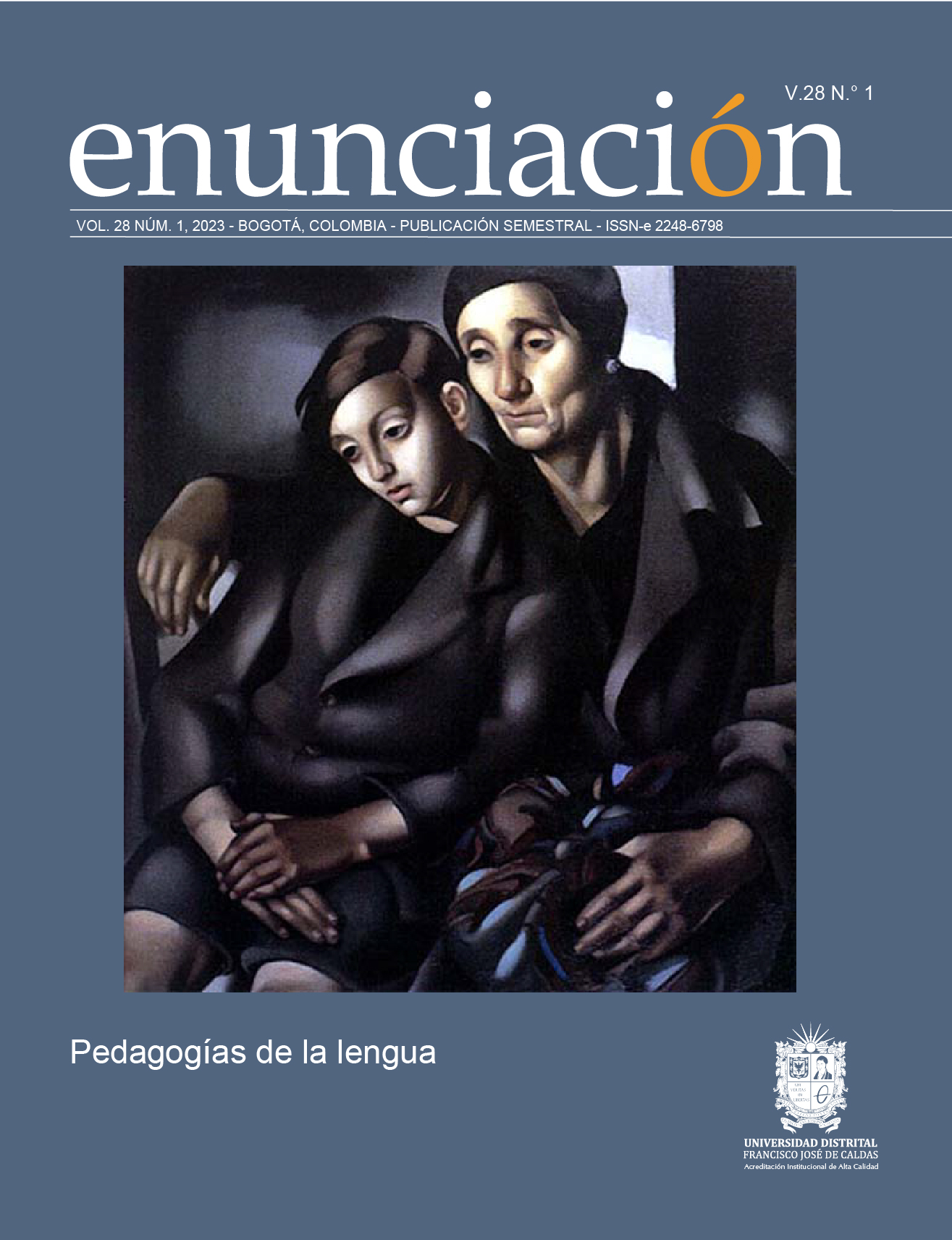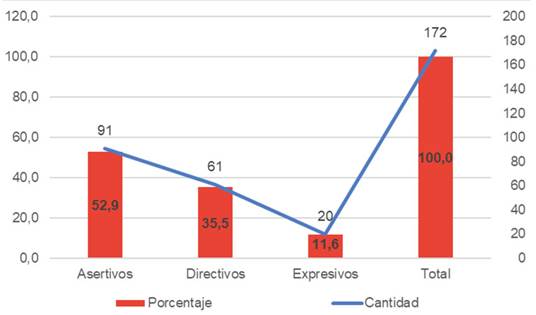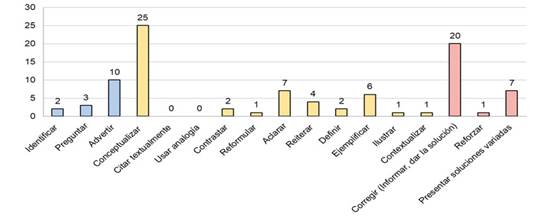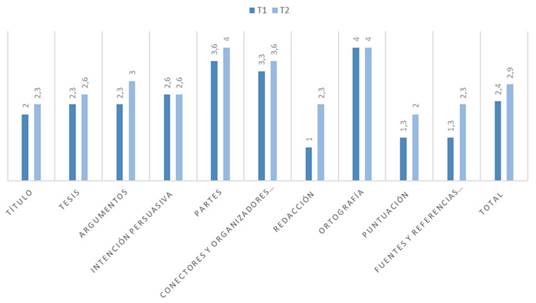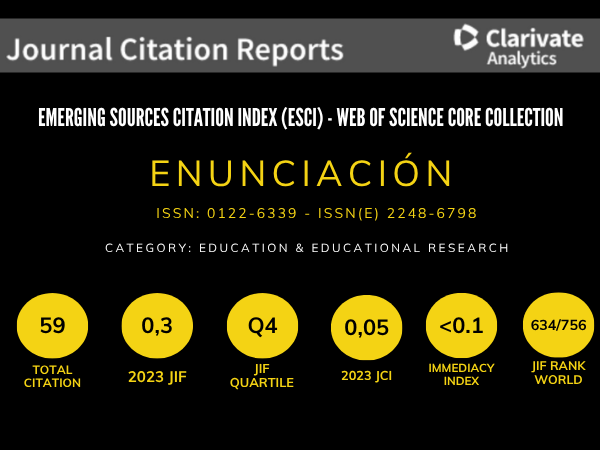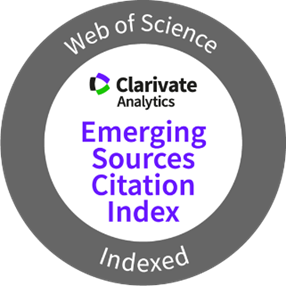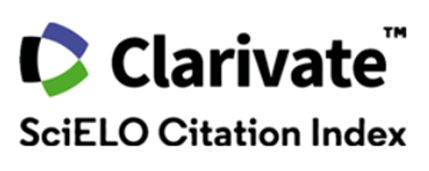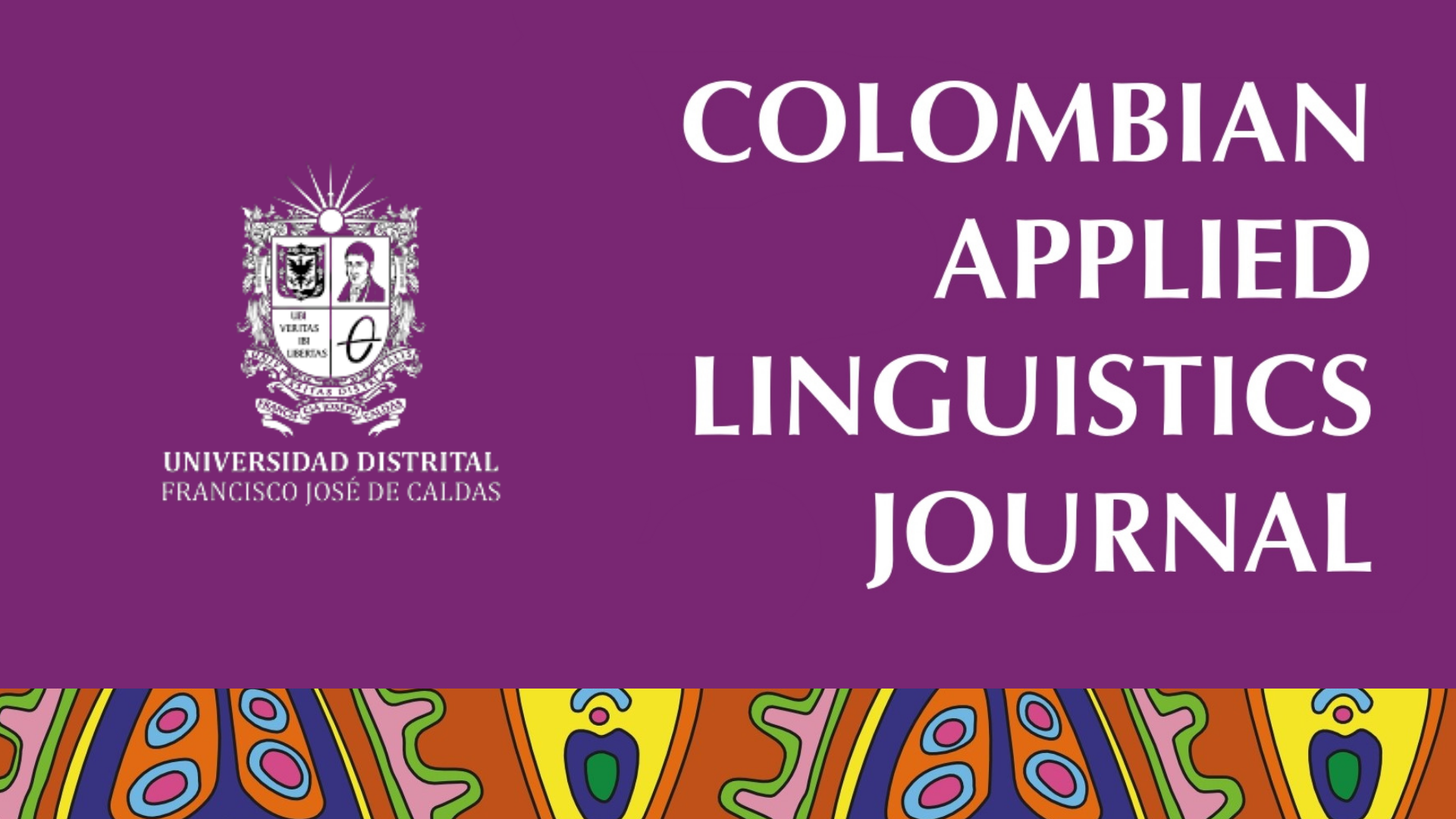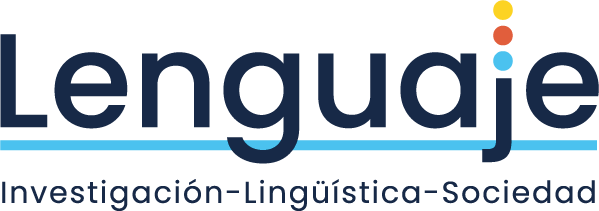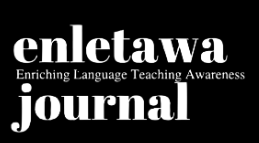DOI:
https://doi.org/10.14483/22486798.19750Publicado:
29-11-2022Número:
Vol. 28 Núm. 1 (2023): Pedagogías de la lengua (Ene-Jun)Sección:
Literatura y otros lenguajesEstudio de caso de retroalimentación no directiva mediante enunciados asertivos
Case Study on Non-Directive Feedback through Assertive Statements
Palabras clave:
comunicación oral, asertividad, evaluación educativa, interacción en la educación, retroalimentación (es).Palabras clave:
oral communication, assertiveness, formative assessment, interaction in education, feedback (en).Descargas
Referencias
Adam, J. M. (1992). Les textes: types et prototypes. Nathan.
Aljaafreh, A. y Lantolf, J. P. (1994). Negative feedback as regulation and second language learning in the zone of proximal development. The Modern Language Journal, 78(4), 465-483. https://doi.org/10.2307/328585. DOI: https://doi.org/10.1111/j.1540-4781.1994.tb02064.x
Álvarez Angulo, T. (2010). Competencias básicas en escritura. Octaedro.
Álvarez Angulo, T. (2013). Didáctica de la lengua para la formación de maestros. Octaedro.
Arancibia Gutiérrez, B., Tapia-Ladino, M. y Correa Pérez, R. (2019). La retroalimentación durante el proceso de escritura de la tesis en carreras de pedagogía: descripción de los comentarios escritos de los profesores guías. Revista Signos, 52(100), 242-264. https://dx.doi.org/10.4067/S0718-09342019000200242. DOI: https://doi.org/10.4067/S0718-09342019000200242
Bereiter, C. y Scardamalia M. (1987). The psychology of written composition. Erlbaum. DOI: https://doi.org/10.1016/B978-0-08-088583-4.50006-6
Bradley, L. y Thouësny, S. (2017). Students’ collaborative peer reviewing in an online writing environment. Themes in Science & Technology Education, 10(2), 69-83.
Bitchener, J., Basturkmen, H. y East, M. (2010). The focus of supervisor written feedback to thesis/dissertation students. International Journal of English Studies, 10(2), 79-97. https://doi.org/10.6018/ijes/2010/2/119201. DOI: https://doi.org/10.6018/ijes/2010/2/119201
Calsamiglia, H., y Tusón, A. (1999). Las cosas del decir. Manual del análisis del discurso. Ariel.
Carless, C. y Boud, D. (2018). The development of student feedback literacy: Enabling uptake of feedback. Assessment & Evaluation in Higher Education, 43(8), 1315-1325. https://doi.org/10.1080/02602938.2018.1463354. DOI: https://doi.org/10.1080/02602938.2018.1463354
Carless, C. y Winstone, N. (2020). Teacher feedback literacy and its interplay with student feedback literacy. Teaching in Higher Education. https://doi.org/10.1080/13562517.2020.1782372. DOI: https://doi.org/10.4324/9781351115940-3
Castelló, M. (2008). Aprender a escribir, escribir para aprender. Aula de Innovación Educativa, 175, 7-9.
Castelló, M., González, D. e Iñesta, A. (2010). La regulación de la escritura académica en el doctorado: el impacto de la revisión colaborativa en los textos. Revista Española de Pedagogía, LXVIII(247), 521-537.
Consejo de Europa. (2001). Marco común europeo de referencia para el aprendizaje, la enseñanza y la evaluación de lenguas. Secretaría General Técnica del MEC, Anaya e Instituto Cervantes.
Corcelles, M., Cano, M., Bañales, G. y Vega, N. A. (2013). Enseñar a escribir textos científico-académicos mediante la revisión colaborativa: el trabajo final de grado en Psicología. Revista de Docencia Universitaria, 11(1), 79-104. DOI: https://doi.org/10.4995/redu.2013.5593
Corcelles, M., Cano, M., Mayoral, P. y Castelló, M. (2017). Enseñar a escribir un artículo de investigación mediante la revisión colaborativa: Percepciones de los estudiantes. Revista Signos: Estudios de Lingüística, 50(95), 337-360. http://dx.doi.org/10.4067/S0718-09342017000300337 DOI: https://doi.org/10.4067/S0718-09342017000300337
Ducasse, A. M. (2022). Oral reflection tasks: Advanced Spanish L2 learner insights on emergency remote teaching assessment practices in a higher education context. Languages, 7(1), 26. https://doi.org/10.3390/languages7010026 DOI: https://doi.org/10.3390/languages7010026
East, M., Bitchener, J. y Basturkmen, H. (2012). What constitutes effective feedback to postgraduate research students? The students’ perspective. Journal of University Teaching & Learning Practice, 9(2). 10.53761/1.9.2.7. DOI: https://doi.org/10.53761/1.9.2.7
Elbow, P. (1973). Writing without teachers. Oxford University Press.
Ellis, R. (1997). The study of second language acquisition. Oxford University Press.
Escandell, M. V. (1996). Introducción a la pragmática. Ariel Lingüística.
Ferreira, A. (2017). El efecto del feedback correctivo para mejorar la destreza escrita en ELE. Colombian Applied Linguistics Journal, 19(1), 37-50. http://dx.doi.org/10.14483/calj.v19n1.10220. DOI: https://doi.org/10.14483/calj.v19n1.10220
Flower, L. y Hayes, J. (1981). A cognitive process theory of writing. National Council of Teachers of English, 32(4), 365-387. DOI: https://doi.org/10.2307/356600
Graham, S. (2018). A revised writer(s)-within-community model of writing. Educational Psychologist, 53(4), 258-279. https://doi.org/10.1080/00461520.2018.1481406. DOI: https://doi.org/10.1080/00461520.2018.1481406
Grupo Didactext. (2015). Nuevo marco para la producción de textos académicos. Didáctica. Lengua y Literatura, 27, 219-254. https://doi.org/10.5209/rev_DIDA.2015.v27.50871. DOI: https://doi.org/10.5209/rev_DIDA.2015.v27.50871
Hayes, J. (1996). A new framework for understanding cognition and affect in writing. En C. M. Levy y S. Ransdell (eds.), The science of writing. Theories, methods, individual differences and applications (pp. 1-27). Lawrence Erlbaum Associates.
Hattie, J. y Clarke, S. (2020). Aprendizaje visible: Feedback. Paraninfo Universidad.
Holmes, J. (2001). An introduction to sociolinguistics. (2.ª ed.). Longman.
Hughes, S. (2021). The role of sociocultural theory in L2 empirical research. Studies in Applied Linguistics & TESOL at Teachers College, 21(1), 41-46. DOI: https://doi.org/10.52214/salt.v21i1.8394
Hyland, K. (2009). Academic discourse: English in a global context. Continuum.
Instituto Cervantes. (2006). Plan curricular del Instituto Cervantes. Niveles de Referencia para el español.
Kellogg, R. T. (1996). A model of working memory in writing. En C. M. Levy y R. Ransdell (eds.), The science of writing: Theories, methods, individual differences and applications (pp. 57-72). Lawrence Erlbaum Associates.
Kumar, V. y Stracke, E. (2007). An analysis of written feedback on a PhD thesis. Teaching in Higher Education, 12(4), 461-470. https://doi.org/10.1080/13562510701415433. DOI: https://doi.org/10.1080/13562510701415433
López, P., Torrance, M., Rijlaarsdam, G. y Fidalgo, R. (2021). Evaluating effects of different forms of revision instruction in upper-primary students. Reading and Writing: An Interdisciplinary Journal, 34, 1741-1767 (2021). https://doi.org/10.1007/s11145-021-10156-3. DOI: https://doi.org/10.1007/s11145-021-10156-3
Mateo-Girona, M. T., Uribe Álvarez, G., Agosto Riera, S. E. y Álvarez Angulo, T. (coords.) (2020). El miniensayo en las materias del currículo de Secundaria. Octaedro.
Murray, D. M. (1972). Teach writing as a process not product. En V. Villanueva y K. L. Arola (eds.), Cross-talk in comp theory: A reader (pp. 3-6). (3.ª ed.). The New England Association of Teachers of English.
Narciss, S. (2013). Designing and evaluating tutoring feedback strategies for digital learning environments on the basis of the interactive tutoring feedback model. Digital Education Review, 23, 7-26.
Poehner, M. y Lantolf, J. (2021). The ZPD, second language learning, and the тransposition ~ transformation dialectic. Cultural-Historical Psychology, 17(3), 31-41. https://doi.org/10.17759/chp.2021170306 DOI: https://doi.org/10.17759/chp.2021170306
Prior, P. y Bilbro, R. (2012). Academic enculturation: Developing literate practices and disciplinary identities. En M. Castelló y Ch. Donahue (eds.), University writing: Selves and texts in academic societies (pp. 19-32). Emerald. DOI: https://doi.org/10.1163/9781780523873_003
Ramírez, L. y López, K. (2018). Orientar la escritura a través del currículum. Sello Editorial Javeriano.
Roulet, E., Auchlin, A., Moeschler, J., Rubattel, C. y Schelling, M. (1985). L’articulation du discours en français contemporain. Peter Lang.
Ruiz Olabuénaga, J. I. (2007). Análisis de contenido. En Metodología de la investigación cualitativa (pp. 191-210). (4.ª ed.). Universidad de Deusto.
Scardamalia, M. y Bereiter, C. (1987). Knowledge telling and knowledge transforming in writing composition. En S. Rosenberg (ed.), Advances in applied psycholinguistics. Reading, writing, and language learning (vol. 2, pp. 142-175). Cambridge University Press.
Schiavinato, N. (2020). La escritura académica de los estudiantes de comunicación: desafíos para su incorporación al campo disciplinar. Grado Cero: Revista de Estudios en Comunicación, 2, 1-20. http://dspace.uces.edu.ar:8180/xmlui/handle/123456789/5306.
Searle, J. (1980). Actos de habla. Cátedra.
Sinclair, J. y Coulthard, M. (1975). Towards an analysis of discourse. Oxford University Press.
Tapia-Ladino, M., De La Ho, M. y Sáez-Carrillo, K. (2020). ¿Qué hacen los escritores con los comentarios escritos (CE) que ofrecen los profesores a los seminarios de grado en programas de pedagogía en inglés? Alpha, 51, 109-123. http://dx.doi.org/10.32735/s0718-2201202000051849.
Van Ek, J. A. y Trim, J. L. M. (1998). Threshold 1990, Cambridge. Cambridge University Press. https://doi.org/10.1017/CBO9780511667176. DOI: https://doi.org/10.1017/CBO9780511667176
Vygotsky, L. S. (1978). Mind in society. The development of higher psycological processes. Harvard University Press.
Yamalee, E. y Tangkiengsirisin, S. (2019). Effects of integrated feedback on academic writing achievement. Arab World English Journal, 10(3) 250-270. https://dx.doi.org/10.24093/awej/vol10no3.17. DOI: https://doi.org/10.24093/awej/vol10no3.17
Zhao, Y. y Ellis, R. (2022). The relative effects of implicit and explicit corrective feedback on the acquisition of 3rd person-s by Chinese university students: A classroom-based study. Language Teaching Research, 26(3), 361-381. https://doi.org/10.1177/1362168820903. DOI: https://doi.org/10.1177/1362168820903343
Cómo citar
APA
ACM
ACS
ABNT
Chicago
Harvard
IEEE
MLA
Turabian
Vancouver
Descargar cita
Recibido: 29 de septiembre de 2022; Aceptado: 29 de noviembre de 2022
Resumen
Existen diversas metodologías que buscan mejorar el proceso de revisión y reescritura, entre otras, la revisión de pares y las tutorías entre un escritor novel y uno más experimentado (Bradley y Thouësny, 2017; Corcelles et al., 2017; Ramírez y López, 2018; entre otros). En el caso de las tutorías, son escasos los análisis de los comentarios orales en la interacción entre los participantes. El objetivo en este escrito es clasificar los enunciados que permiten una retroalimentación no directiva y evaluar si con ellos existe una mejora en el texto. Para ello, se analizan los enunciados asertivos durante una tutoría de revisión y reescritura del borrador de un miniensayo, por medio del concepto de actos de habla (Searle, 1980), específicamente los asertivos (Instituto Cervantes, 2006). A partir de la grabación de la tutoría con Google Meet, se realizó un análisis de contenido (Ruiz Olabuénaga, 2007) de actos de habla asertivos; así, se obtuvo un corpus de 91 sobre un total de 172 enunciados. Luego, tres pares ciegos evaluaron los textos y se compararon sus valoraciones. Los principales hallazgos son: a) 17 modalidades de retroalimentación asertiva: preguntar, advertir, identificar, conceptualizar, definir, reformular, aclarar, reiterar, ejemplificar, ilustrar, citar textualmente, usar analogía (o comparación), contrastar, contextualizar, corregir, presentar soluciones variadas, reforzar; y b) no hay una mejora significativa entre el texto borrador y la versión final. Se concluye que la presencia de actos de habla asertivos contribuye a darle un carácter formativo a la evaluación comunicativa cuyo objetivo sea el fomento de su autonomía del estudiante como escritor.
Palabras clave:
comunicación oral, asertividad, evaluación educativa, interacción en la educación, retroalimentación.Keywords:
oral communication, assertiveness, formative assessment, interaction in education, feedback.Abstract
There are several methodologies that seek to improve the revision and rewriting process, including peer review and tutorials between a novice and a more experienced writer. In the case of tutorials, analyses of oral comments in the interaction between participants are scarce. The aim of this work is to classify the statements that allow for non-directive feedback, as well as to evaluate whether there is an improvement in the text. To this effect, an analysis was performed on the assertive statements during a tutoring session to revise and rewrite the draft of a mini essay, using the concept of speech acts, specifically assertive ones. From the recording of the tutorial obtained via Google Meet, a content analysis of assertive speech acts was carried out, obtaining a corpus of 91 out of a total of 172 statements. The texts were then evaluated by three blind peers, and their ratings were compared. The main findings are a) 17 modalities of assertive feedback: asking, warning, identifying, conceptualizing, defining, rephrasing, clarifying, reiterating, exemplifying, illustrating, quoting, using analogy (or comparison), contrasting, contextualizing, correcting, presenting varied solutions, and reinforcing; b) there is no significant improvement between the draft text and the final version. It is concluded that the presence of assertive speech acts contributes to the formative character of communicative assessment, whose objective is fostering the learner’s autonomy as a writer.
Palabras clave:
comunicación oral, asertividad, evaluación educativa, interacción en la educación, retroalimentación.Keywords:
oral communication, assertiveness, formative assessment, interaction in education, feedback.Introducción
El proceso de escritura requiere una fase de revisión y reescritura (Grupo Didactext, 2015; Graham, 2018; López et al., 2021), en la que el escritor debe realizar cambios en su texto. Sin embargo, muchas veces, debido a la inexperiencia de este, no hay cambios sustanciales, pues solo advierten errores superficiales.
En este contexto, los escritores, especialmente los noveles, requieren de un acompañamiento que les indique cómo mejorar o les entregue herramientas y estrategias de producción escrita. En tal sentido, aunque son muchos los estudios sobre feedback, la mayoría de los profesores suele realizar una revisión intrusiva, en tanto se les ofrecen a los estudiantes las respuestas directamente a sus problemas (knowledge of correct response (KCR)) (Narciss, 2013). Además, los comentarios escritos han sido ampliamente estudiados (Tapia et al., 2020; Arancibia et al., 2019; Yamalee y Tangkiengsirisin, 2019), pero en relación con los comentarios orales hay menos investigación (Ducasse, 2022). Por esta razón, el objetivo general de este trabajo intenta averiguar qué tipos de enunciados permiten una retroalimentación no directiva, así como su efectividad.
En este marco, se aplicó una secuencia didáctica en la cual se guio a los estudiantes en el proceso de escritura, y para la fase de revisión, se ofreció el acompañamiento por tutores voluntarios especializados por medio de un servicio de asesorías. Se observó que las intervenciones de los tutores eran predominantemente directivas. Sin embargo, el proceso de una de las estudiantes con su tutora resultó significativo por su intervención no intrusiva. En este sentido, la presente investigación explora con evidencia empírica la efectividad de un feedback eminentemente no directivo, en contraposición a uno directivo para la producción de un escritor novel.
De este modo, las preguntas de investigación que guiaron el estudio fueron las siguientes:
-
¿Qué tipos de enunciados asertivos permiten una retroalimentación no directiva?
-
¿Mejora el texto de la estudiante con una retroalimentación no directiva?
A continuación, se presenta el marco de referencia necesario para abordar el objeto de estudio de esta investigación: los enunciados asertivos de una retroalimentación no directiva. Posteriormente, se explica la metodología y los principales hallazgos. Por último, se exponen la discusión y conclusiones.
Marco teórico
¿Qué se entiende por revisión y reescritura?
La revisión y reescritura, en el comienzo de los estudios cognitivistas de la escritura, se consideró la etapa final del modelo procesual escritural (Elbow, 1973; Murray, 1972). Sin embargo, no tardaron en aparecer estudios que ampliaron esta concepción de la revisión hacia una acción recursiva presente a lo largo de todo el proceso, cuya aplicación puede darse de manera superficial y profunda en el texto en cada momento de la escritura (Flower y Hayes, 1981; Bereiter y Scardamalia, 1987; Hayes, 1996; Kellogg, 1996).
Asimismo, el enfoque cognitivista distingue, en la escritura, aquellos procesos cognitivos de bajo nivel o mecánicos de los de alto nivel o sustanciales. En concreto, la revisión y reescritura se muestra como un proceso de alto nivel cognitivo, por lo que se fragmenta en subprocesos más sencillos que puedan ser estudiados con menor dificultad. La descripción de las operaciones mentales que intervienen en la revisión (Scardamalia y Bereiter, 1987) derivan en la propuesta CDO (comparación, diagnóstico y operación), la cual ha sido presentada en el ámbito hispano como: detectar, diagnosticar y corregir (Álvarez Angulo, 2010). Se pueden describir de la siguiente manera:
-
Detectar. Discriminar los aspectos problemáticos o mejorables. Los problemas o mejoras se localizan en los diferentes niveles lingüísticos y textuales (Álvarez Angulo, 2010, 2013).
-
Diagnosticar. Identificar las causas del problema o de la mejora. Para el diagnóstico, se deben explicar cuestiones relativas a los distintos niveles lingüísticos y textuales, por lo que se requiere de estos conocimientos específicos. Los comentarios asertivos presentados en este artículo son, en su mayoría, de carácter explicativo, por lo que cumplen esta función de contribuir a aclarar las causas del diagnóstico del problema
-
Corregir. Detectar la acción cognitiva y modificar el texto, es decir, se debe aplicar el mecanismo cognitivo de revisión (MCR) y reescribir el problema detectado. Los MCR se simplifican en cuatro: añadir, suprimir, sustituir y reorganizar (Álvarez Angulo, 2013).
Por tanto, desde los estudios cognitivos, se pueden situar los comentarios de retroalimentación de carácter asertivo, en cada una de las etapas del proceso de revisión; aunque, principalmente, por su carácter predominantemente explicativo, se relacionan de manera estrecha con el momento del diagnóstico.
Los usos funcionales en los comentarios orales de retroalimentación
Nociones para una categorización de las funciones asertivas en los comentarios orales
Acto de habla asertivo
En primer lugar, se entiende por acto de habla asertivo aquel enunciado que dice algo acerca de la realidad con diferentes grados de certeza (Calsamiglia y Tusón, 1999; Escandell Vidal, 1996). Se sitúa entre las cinco categorías que estableció Searle (1969) para realizar su clasificación de los actos de habla: asertivos, directivos, compromisorios, expresivos y declarativos. En cuanto a los asertivos, la concepción clásica los delimita como enunciados declarativos con los que el hablante informa a su oyente sobre un hecho que considera verdadero. De esta manera, Searle especifica que se deben dar las siguientes condiciones para que sea considerado verdadero por el hablante: el hablante tiene evidencias o razones para la verdad de lo que declara; cree que lo que declara es verdadero; asume que lo que declara se presenta al mundo como verdadero. No obstante, en el desarrollo de esta teoría, se percibe que no todos los actos de habla asertivos expresan una información que sea considerada cierta o segura por el enunciatario. Estas condiciones de asertividad permiten realizar la graduación de los enunciados de mayor a menor asertividad.
El presente análisis aporta la ejemplificación de exponentes lingüísticos para graduar los enunciados en más o menos asertivos. De manera general, se puede relacionar el uso del modo indicativo como criterio de más asertividad, frente al uso del subjuntivo como exponente de menor asertividad.
Funciones asertivas
Por otra parte, se puede observar que la enunciación asertiva cumple una función informativa; así, es la enunciación apropiada para la tipología de textos explicativos (Adam, 1992). De esta manera, en el proceso explicativo, el enunciador expone una información para ayudar a resolver un problema al enunciatario; mientras que, por su parte, este último asume la función de resolver el problema a través de la comprensión de la información expuesta. Esta tarea se compone de tres fases: a) inicial, en la que se identifica el problema, es decir, se plantea la cuestión que se ha de resolver (¿por qué?); b) resolutiva, en la que se emplean los procedimientos explicativos para resolver el problema; y c) evaluativa, que concluye con la sistematización del conocimiento desarrollado. En el caso del tutor que ayuda al estudiante a mejorar la expresión de su texto, se posiciona como enunciador que explota una serie de procedimientos explicativos para resolver un problema. Esto se debe a que, en la revisión, el estudiante debe construir, a partir del texto producido, el texto que pretendió escribir; es decir, elaborar el texto con el mensaje que desea transmitir. Por tanto, en la interacción con el revisor del texto, el escritor va percatándose de los errores, la incongruencia entre lo que efectivamente dijo y lo que quería decir. Así, va comprendiendo a qué se deben tales fallos y termina corrigiendo su expresión con la solución adecuada. Las mediaciones del tutor transitarán desde los comentarios en los que únicamente propicie la reflexión, sin apenas intervenir en la construcción del texto final, hasta los comentarios en los que señale de manera explícita el error y medie con indicaciones acerca de lo que debe reconstruir el autor.
Para finalizar, los tres momentos comentados, en el proceso explicativo se corresponden con las estrategias mentales: identificar, diagnosticar y corregir (o modificar).
Género comentario oral
Son múltiples las clasificaciones de las unidades conversacionales. La escuela de Ginebra (Roulet et al., 1985), basada en la tipología conversacional prototípica de la escuela de Birmingham (Sinclair y Coulthard, 1975), diferencia cinco unidades que pueden analizarse en una conversación: la interacción (conjunto de la conversación); la secuencia (parte de la conversación que posee unidad temática, por ejemplo: secuencia de apertura o secuencia de cierre); el intercambio (unidad mínima dialogada); turnos conversacionales (intercambio de mensajes estructurado), y la intervención (aportación de cada participante en un intercambio).
De esta clasificación, surge la concepción del género comentario oral o de habla, que puede definirse como la unidad conversacional que se compone de intervenciones y que, a su vez, conforma los intercambios en un diálogo. Este género, situado en el contexto de una tutoría sobre escritura académica, es para el que se ofrece la categorización de funciones asertivas que se desarrolla a continuación.
Categorización de las funciones asertivas en los comentarios orales de retroalimentación
En el presente apartado se expone la propuesta de clasificación de actos de habla asertivos desarrollada, principalmente, a partir del Plan curricular del Instituto Cervantes (Instituto Cervantes, 2006); en concreto, a partir de la competencia pragmática-funcional del Marco Común de Referencia Europeo (MCRE), las microfunciones relacionadas con las siguientes finalidades con “dar y pedir información” (Instituto Cervantes, 2006) (tabla 1). Estas finalidades provienen, a su vez, de la clasificación “ofrecer y buscar información factual” propuesta por Van Ek y Trim (1998) y por el Consejo de Europa (2001).
Nota. VanEk y Trim (1998); Consejo de Europa (2001); Instituto Cervantes (2006).
Tabla 1: Correlación entre funciones asertivas ordenadas según los tres momentos de la revisión textual.

Se parte de la noción de función, ya que cada intervención produce una respuesta y hace progresar la interacción según la finalidad que se persiga. Se correlacionan los tres momentos de la revisión en la sucesión de etapas del esquema conversacional: desde los intercambios iniciales hasta la conclusión. Las funciones asertivas de los intercambios realizados en una retroalimentación por parte del tutor pueden ser las siguientes1:
Detectar
-
Identificar: determinar o reconocer un aspecto positivo o mejorable de un texto. (Exponente: “Este... y no...”. Ejemplo: “Esta, y no la cita indirecta, es la que conviene para esta explicación”).
-
Preguntar: interpelar o cuestionar un aspecto del texto para provocar la detección de un aspecto positivo o mejorable de un texto. (Exponente: “¿Qué es lo que...?”. Ejemplo: “¿Qué es lo que quieres decir con esta frase?”).
-
Advertir: avisar sobre un aspecto positivo o mejorable de un texto. (Exponente: “Te anticipo/prevengo”. Ejemplo: “Le anticipo que, de ahora en adelante, este modo de citar debes revisarlo por tu cuenta en todo el texto”)
Diagnosticar
-
Conceptualizar: teorizar sobre una cuestión del texto. (Exponente: “Por causa de (que)/gracias a (que)/por culpa de (que)...”. Ejemplo: “El texto está bien cohesionado gracias a que has seleccionado correctamente los conectores”).
-
Citar textualmente: referenciar ideas de otros autores. (Exponente: “Como dice/como defiende...”. Ejemplo: “Como defiende Fernández”)
-
Usar analogía o comparación: analizar con atención un aspecto del texto para establecer sus semejanzas o diferencias con otros. (Exponente: “Esto es como...”. Ejemplo: “Esta regla es como la anterior pero sin comillas”)
-
Contrastar: mostrar diferencias o condiciones opuestas al comparar dos aspectos relacionados con el texto. (Exponente: “La diferencia con respecto a...”. Ejemplo: “La diferencia con respecto a la cita indirecta es el uso de comillas”)
-
Reformular: volver a expresar algo de otra manera. (Exponente: “Es decir/en otras palabras...”. Ejemplo: “En otras palabras, no se trata de cambiar el texto”).
-
Aclarar: mostrar con transparencia lo que permanecía no comprensible. (Exponente: “No es que..., es que + confirmación (intensificada mediante metáforas, hipérboles, etc.)”. Ejemplo: “(-¿Lo quito?) -No es que lo tengas que quitar, es que lo tienes reformular”)
-
Reiterar: repetir una explicación. (Exponente: “Así es/Efectivamente (+ enunciado confirmativo)”. Ejemplo: “Así es, debes reformularlo”)
-
Definir: fijar con claridad y precisión el significado de una palabra. (Exponente: “Es + Adjetivos/SN”. Ejemplo: “Es un conector causal”)
-
Ejemplificar: ilustrar con ejemplos lo que se explica. (Exponente: “Por ejemplo/en el caso de...”. Ejemplo: “En el caso del texto, puedes ver un conector consecutivo”)
-
Ilustrar: mostrar con palabras, imágenes o de otro modo alguna realidad. (Exponente: “Poder ver/visualizar/figurar + en...”. Ejemplo: “Como puedes ver en el esquema, no necesitas poner el lugar de la publicación”).
-
Contextualizar: situar una cuestión o asunto a tratar. (Exponente: “En este contexto/caso...”. Ejemplo: “En este caso concreto debes tener en cuenta la intención del autor)
Corregir
-
Modificar: advertir de un aspecto mejorable del texto. (Exponente: “Yo (no) diría que…”. Ejemplo: “(-¿Está bien el conector?) -Es correcto gramaticalmente, pero yo usaría otro para no repetirlo)
-
Reforzar: fortalecer un aspecto positivo. (Exponente: operador discursivo de refuerzo argumentativo: “de hecho”, “en efecto”, “en el fondo”, “en realidad”, “la verdad”. Ejemplo: “De hecho, debes ponerlo en otro párrafo”)
-
Presentar soluciones variadas: solventar dificultades o situaciones críticas. (Exponente: “¿... o, por el contrario, ...?”. Ejemplo: “¿Debo modificar los criterios o, por el contrario, seguir en la misma línea?)
Tipos de retroalimentación en la escritura: directiva y no directiva
Así como se ha destacado el carácter cognitivo del proceso de revisión y reescritura, se concibe la retroalimentación desde un enfoque sociocultural. El diálogo y negociación entre el escritor y un par más experto se ajusta al concepto de zona de desarrollo próximo de Vygotsky (1978), puesto que la interacción social permite al escritor avanzar desde el nivel de desarrollo real al nivel de desarrollo potencial (Aljaafreh y Lantolf, 1994; Hughes, 2021; Poehner y Lantolf, 2021). En este sentido, la retroalimentación por parte de un experto o un par más avanzado no solo da cuenta de las relaciones entre los participantes; sino que, en los estudios de literacidades académicas, promueve la enculturación (Hyland, 2009; Prior y Bilbro, 2012; Schiavinato, 2020) con respecto a la integración de los estudiantes en su comunidad académica.
El intercambio con una persona más experimentada permite al escritor novel asimilar las convenciones disciplinares y discursivas, y distinguir qué es y no es correcto, de manera que se apoyan dichos procesos de enculturación académica.
Sin embargo, es necesario señalar que la retroalimentación no es garantía del progreso en el estudiante. En primer lugar, interesa el análisis de los tipos de retroalimentación en escritura. Se encuentran estudios sobre los comentarios escritos, especialmente en la revisión de pares (Bradley y Thouësny, 2017; Castelló, 2008; Castelló et al., 2010; Corcelles et al., 2013; Corcelles et al., 2017; Ramírez y López, 2018; entre otros), pero ha sido menos investigado en los comentarios orales. Además, interesa de manera concreta analizar de qué manera un feedback directivo tiene más o menos impacto que uno no directivo. Siguiendo a Ellis (1997) y a Zhao y Ellis (2020), la retroalimentación correctiva -equivalente a directiva-, se refiere a una indicación directa sobre algún error. Ferreira (2017) indica que cognitivamente la función del feedback correctivo es entregar información que los estudiantes pueden aplicar de manera activa en la modificación de los errores de sus enunciados. Incluso, más allá únicamente de lo cognitivo, autores como Carless y Boud (2018); Hattie y Clarke (2020), y Carless y Winstone (2020) abogan por una alfabetización en retroalimentación que implique cuatro aspectos: apreciar la retroalimentación, hacer juicios, manejar el afecto y actuar; lo cual apunta hacia un perfil de estudiante autónomo que recibe el feedback no directivo.
Metodología
Contexto de la investigación
Un grupo de estudiantes debía escribir un texto argumentativo breve (350 palabras) con la siguiente consigna: “¿Afectará la covid-19 a la concreción de los objetivos de la Agenda 2030?”. En el marco de una secuencia didáctica en la que se explicó el proceso de escritura (Grupo Didactext, 2015), se evaluaron textos con una rúbrica (Mateo-Girona et al., 2020, véase anexo 1) y se obtuvo la calificación numérica que da cuenta de la mejora del texto. Estos datos cuantitativos se suman a la información obtenida de la caracterización de los actos de habla producidos en la retroalimentación. Cada escritor tuvo la asesoría de un tutor. La mayoría de estos intercambios fueron de orden directivo. Sin embargo, hubo un caso en el que la intervención pareció menos intrusiva, lo cual diferenció la actuación de la tutora y provocó una respuesta activa de la discente, quien demandaba explicaciones a pesar de que no fueran aportadas por la asesora. Ambos comportamientos simultáneos convirtieron el caso en un evento particular e irrepetible, lo que justificó su selección para obtener un conocimiento profundo del fenómeno abordado.
Participantes
En el marco de este estudio de caso participaron dos estudiantes: una de cuarto año del grado en Maestro en Educación Infantil (tutorizada) y una estudiante de tercer año de un programa de doctorado (tutora), ambas de universidades españolas. El caso estudiado se refiere a los comentarios orales emitidos por la tutora voluntaria que realizó la tutoría con la estudiante de grado. La actividad tuvo lugar en línea a través de Google Meet, con lo cual se pudo grabar y posteriormente realizar una transliteración. La lengua en la que se llevó a cabo fue español, dado que es la lengua materna de ambas participantes, y en la que se produjo el miniensayo. Ambas estudiantes participaron en la investigación voluntariamente bajo previo consentimiento informado.
Instrumentos
A partir de la técnica speak loud para conocer las dificultades y necesidades de la estudiante de grado, se realizó la revisión y reescritura de su texto bajo la supervisión de la tutora. Para ello, utilizaron como guía de apoyo la rúbrica mencionada (Mateo-Girona et al., 2020). El objetivo de esta tutoría era doble: por una parte, evaluar el funcionamiento de la rúbrica en línea y, por otro, analizar el tipo de retroalimentación ejercida y su impacto en la reescritura del texto. Entre las condiciones de la tutoría se estableció un tiempo ilimitado para la revisión y reescritura; la estudiante no realizó la reescritura parcial o completa antes de la tutoría.
Para el registro del procedimiento, tal como se indicó, se grabó la sesión a través de Google Meet, la cual tuvo una duración de 02:36:11. La estudiante compartió su pantalla con la tutora, y así mostró cada una de las acciones ejecutadas. Además, la estudiante expresó en voz alta todos sus pensamientos y sentimientos. Por su parte, la tutora tenía como tareas tomar notas y preguntar en el caso de observar que hubiera algo que la estudiante pudiera explicar más. En cuanto a la preparación de la sesión, la tutora no recibió una formación específica sobre cómo debía ser su retroalimentación para no condicionar los resultados.
Por último, para saber qué impacto tuvieron los comentarios orales en el texto final, es decir, si este había mejorado o no, se solicitó a tres evaluadores ciegos que revisaran las dos versiones del texto en función de la rúbrica utilizada como guía de la tutoría. De esta manera, los datos obtenidos se detallan en la tabla 2.
Tabla 2: Datos recogidos

Procesamiento de datos
Se utilizó el análisis de contenido. La unidad examinada ha sido el turno de habla que, como se ha explicado en el apartado “Género comentario oral”, se corresponde con ese género discursivo. Como puede comprobarse en la figura 1, a partir de la selección de los turnos de habla de la tutora se realizó una segmentación del contenido a través de categorías preliminares (172), que finalmente se agruparon en tres categorías generales de enunciados: directivos (61), asertivos (91) y expresivos (20).
Figura 1: Porcentaje, cantidad y tipo de comentarios empleados
El objeto de estudio de esta investigación se remite a los enunciados asertivos, ya que fueron los que predominaron en esta retroalimentación no directiva.
Para analizar los turnos de habla de la tutora, se siguió un procedimiento de peer code review.
En primera instancia, se analizaron segmentos de forma individual por cada una de las investigadoras (más del 20 % de la muestra) y, luego, se puso en común la codificación realizada, con la finalidad de reducir el porcentaje de error y llegar a acuerdos para los enunciados que poseían más de una función. En tales casos, se decidió fragmentar el enunciado según la función predominante. En la tabla 3 se ilustra este procedimiento.
El enunciado de la tutora comprende desde la línea 208 a la línea 211 de la transliteración de la grabación. Sin embargo, debido a que den-tro del enunciado de carácter asertivo existen tres funciones (identificar, conceptualizar y contrastar), se optó por fragmentar el turno de habla.
Tabla 3: Ejemplo de fragmentación de un enunciado

Resultados
Pregunta de investigación 1. ¿Qué tipos de enunciados permiten una retroalimentación menos directiva?
A continuación, se exponen cada una de las funciones encontradas mediante comentarios que ilustran el tipo de función presente en forma de continuum: desde las menos directivas a las más directivas.
Identificar
La identificación se vincula con el reconocimiento del error. Sin embargo, en este caso, la tutora no proporciona una explicación del porqué está mal, sino que simplemente se le indica a la estudiante que hay un equívoco. Así se ve en (1), cuando después de la anterior advertencia en relación con el propósito comunicativo del miniensayo, la tutora indica indirectamente (“no es necesario”) que el uso de la primera persona singular es incorrecto:
(1) Sí, y con eso, claro, es lo que si bien es cierto tienes razón no es necesario que digamos “yo opino”.
Preguntar
La tutora comenta con la estudiante cuál es el artículo que determina al sustantivo, para lo que utiliza el recurso de preguntar, tal como se aprecia en (2):
(2) Pero ojo que ¿recuerdas que tuvieron una pequeña discusión sobre si era la covid o el covid?
Con esta pregunta se invita a que sea la estudiante quien busque información al respecto y llegue a la solución de la duda que se le ha presentado.
Advertir
En esta categoría la tutora señala algún aspecto que la estudiante debe tener en consideración. En (3) se observa cómo ante el desvío de la estudiante con respecto a la finalidad comunicativa del miniensayo, la tutora recuerda que este es el de argumentar:
(3) Puede ser, pero lo importante es que no pierdas de vista que el propósito es argumentar, entonces sí que te tienes que posicionar dentro del texto.
Conceptualizar
En esta categoría el centro de atención está en la explicación de un concepto o de un aspecto que pueda ayudar a la estudiante a escribir el texto. En (4) se ilustra cómo la tutora le explica a la estudiante el sistema de citas Vancouver en oposición al sistema APA:
(4) Sí, me parece que ese tipo de referencias, de citas se llama... Vancouver, no estoy segura, pero que va poniendo el número, no aparece en orden alfabético como en APA, sino que en la medida en que tú vas aludiendo a una referencia la pone pie de página.
Citar textualmente
Apelar literalmente a una expresión ajena para ilustrar o ampliar el conocimiento sobre un planteamiento. En (5) se observa cómo la tutora apela a las normas de fiabilidad de fuentes para que la estudiante consulte las más adecuadas:
(5) T: En el recurso cuatro, los criterios de fiabilidad de las fuentes, uno de ellos señala que, según el tipo de publicación, las más confiables se encuentran en revistas científicas indexadas.
E: Sí, lo he visto, que más fiables es que sean revistas científicas.
Usar analogía o comparación
Esta función se encarga de presentar un caso con características comunes al que se examina. Es el caso de (6), en el que la tutora ofrece dos herramientas para la gestión de referencias bibliográficas:
(6) Sí, bueno, Mendeley es una aplicación que puedes descargar o hacer una cuenta y es una nube en donde tú almacenas tus referencias bibliográficas y luego vas poniendo las citas en el cuerpo y te genera automáticamente las referencias al final del texto. Es lo mismo que hace Zotero, ambas son herramientas para la gestión de citas.
Contrastar
Esta categoría consiste en el énfasis de una diferencia entre dos cosas que se presentan como diferentes u opuestas. En (7) la tutora contrasta el uso de un sustantivo aislado con el empleo de un adjetivo calificativo que acompaña al sustantivo, de modo que se le muestra a la estudiante cómo este recurso intensifica la perspectiva desde la cual se sitúa como escritora:
(7) No es lo mismo decir existe o hay una crisis, a decir, no sé, por ejemplo, que estamos enfrentando una horrible crisis frente a… es distinto, ¿sabes?
Reformular
La reformulación implica aclarar algo ya expresado en términos más comprensibles que como se ha hecho originalmente. En el ejemplo (8), la tutora pregunta de manera indirecta cuál el propósito de entregar una tesis y argumentos, frente a lo que la estudiante replica en función de un fragmento concreto del texto, pero no advierte que la tutora se refiere al propósito general. Por tanto, ante esta situación, la tutora reformula lo que ha señalado e indica con otros términos que el propósito del texto es persuadir sobre la tesis expresada por la estudiante:
(8) T: Claro, eso es tu tesis y son tus argumentos, entonces ¿cuál es la acción que tú quieres hacer con tu texto?
E: Pues que al leer se vea que esto sí que repercute, que afecta, que es algo grave, que no es un...
T: Claro, convencer o persuadir sobre tu tesis.
Aclarar
En esta categoría se busca especificar un aspecto concreto de una expresión. En (9) ejemplificamos cómo la tutora proporciona información a la estudiante que le permite comprender que existe más de una manera de referirse a una persona al decir: “no es que esté bien o mal”:
(9) T: Bueno, puedes poner la especialista en... o la autora o lo que tú quieras, porque son referencias a esta misma persona, son otras maneras de referirse a ella.
E: Vale, que no hace falta, ¿que esto lo puedo evitar, no, o así está mal?
T: No es que esté bien o mal, sino que son distintas formas para evitar la repetición.
Reiterar
La reiteración es la repetición de una explicación. En (10), cuando la tutora señala “te decía que...”, es una reiteración de una explicación dada recientemente, en este caso puntual, en relación con los elementos discursivos que puede aprovechar la estudiante para la redacción de su texto:
(10) Te decía que la idea es aprovechar otros elementos discursivos, otros recursos discursivos que potencian más tu texto, lo que tú quieres decir.
Definir
La definición se vincula con la delimitación de un concepto o de algún elemento que genere ambigüedad en la escritura del texto. En (11) se aporta el significado de una expresión concreta:
(11) Ya, porque hincapié significa que tú aludes de una forma particular a algo.
Ejemplificar
La ejemplificación es brindar casos concretos a los que puede ceñirse la estudiante para mejorar el texto. A propósito de los recursos de sustitución léxica, en (12) la tutora le muestra uno de los elementos que puede reemplazar: “el cabe mencionar”:
(12) por ejemplo, el cabe mencionar lo puedes sustituir o lo puedes suprimir.
Ilustrar
Aunque es muy similar a la ejemplificación, en la ilustración se recurre a un ejemplo visual o se remite a una experiencia propia, a una atribución personal. En (13), la tutora alude a una experiencia personal:
(13) Una técnica que yo uso es escribir todo lo que se me viene a la cabeza y una vez que tengo el texto ya definido, que sé que estoy comunicando lo que quiero comunicar, busco la forma de reducir esas palabras, pero lo importante es que comuniques lo que quieres decir, ¿sabes?, o sea, una frase la puedes resumir en dos palabras.
Contextualizar
Es la puesta en relación de una idea o fenómeno en relación con el espacio y tiempo de su producción. En (14) se ilustra esta función:
(14) E: Eso quiere decir que tenga... un autor que sea especializado en ese ámbito, que sea reconocido, científico, o sea, que tenga al menos más de diez citas o de cien, y que esté publicado, que tenga año de publicación y actualización, esto que es el ISSN, eso lo veo en un montón de sitios.
T: Sí, lo que ves es un registro de las fuentes con la información que permite asumir que están validadas y, por lo tanto, son fiables. Seguramente, te ha aparecido en bases de datos al buscar sobre un tema.
Corregir
En la corrección la tutora da directamente la solución frente al error. Así se demuestra en (15) cuando señala que la manera en que la estudiante está citando una fuente es incorrecta:
(15) Claro, no, no, no sería esa la forma de citarlo porque no es un artículo de investigación como los otros.
Reforzar
Es la confirmación de una solución aportada por la estudiante. En (16), la tutora confirma que la estudiante tiene razón al diferenciar el tipo de artículo que ha utilizado como fuente. En primer lugar, le indica que los artículos que está consultando no son de opinión, ante lo que la estudiante se da cuenta de que sí es un artículo de opinión, pero no de la revista que necesita citar. La tutora, por su parte, refuerza esta última idea al decir “a eso me refiero”:
(16) T: Claro, porque si te fijas son artículos, pero no de opiniones.
E: No, es un artículo de opinión es de esta revista, pero no, no está aquí en este índice de artículos publicados.
T: Ya, es que a eso me refiero, que al parecer una cosa es la revista que estás consultando ahora, sí, y otra cosa son los artículos de opinión que como el que... como el que consultaste antes.
Presentar soluciones variadas
En este caso, la tutora presenta otras opciones para que sea la estudiante quien decida cuál alternativa seguir. En (17), la tutora, ante la advertencia de que la estudiante tiene que usar conectores, le ofrece alternativas para que sea ella quien decida cuáles usar:
(17) T: Pero, entonces, ahí es importante el uso de los conectores para que se evidencie que esas tres cosas son dichas por la misma autora.
E: Vale, ahora no se me ocurre ninguno.
T: Por ejemplo, señala por una parte que, por otra parte, que...
E: Vale.
T: En primer lugar, en segundo lugar...
La figura 2 sintetiza el porcentaje de comentarios asertivos de acuerdo con la fase de revisión a la que corresponden (tabla 1).
Figura 2: Porcentaje de comentarios asertivos empleados según la fase de revisión
De acuerdo con la figura 2, el 30,8 % de los enunciados de tipo correctivo muestra que menos de un tercio de la tutoría se dedicó a dar una retroalimentación directiva con el empleo de más andamiaje. En contraposición, predominan los enunciados asertivos de diagnóstico (52,7 %) con su carácter de transmisión de información, que, junto con los enunciados de la fase de detección (16,5 %), suman un total de 69,2 %, lo cual permite afirmar que la retroalimentación fue de tipo no directiva.
En cuanto a qué tipos concretos de comentarios asertivos, estos se presentan de manera desagregada en la figura 3. Se puede observar el predominio de la función advertir (10), entre los correspondientes a la primera fase detectar; a la función de conceptualizar (25), en la fase diagnosticar; y a reformular (20), en corregir.
Figura 3: Cantidad de comentarios asertivos empleados
Pregunta de investigación 2. ¿Mejora el texto de la estudiante con una retroalimentación menos directiva?
De acuerdo con los siguientes criterios que van en una escala de 1 a 4 (siendo 4 la más alta), las valoraciones generales se expresan en la figura 4.
Figura 4: Valoraciones del texto borrador y el texto final
A continuación, se desglosa el análisis de cada uno de los evaluadores.
Título
Los tres evaluadores coincidieron en que el título no presenta mejoras significativas, ya que en promedio solo sube 0,3 puntos. Las razones que atribuyen a esa calificación es que, por una parte, el título remite más a un texto expositivo que a uno argumentativo y, por otra, que, si bien el título se relaciona con el tema del texto, no da cuenta de la idea global. Así queda demostrado en uno de los comentarios: “El título se relaciona con el tema del texto, pero tiene cierta lejanía con una tesis que defiende. Si bien existe un posible título en forma de pregunta sería interesante que lo elaborara más como una afirmación”.
Tesis
En este punto, aunque los evaluadores no coinciden en la banda descriptora del desempeño de la estudiante, coinciden en que no hubo mejoras en el texto, ya que en ambas evaluaciones la estudiante presenta solo 0,2 puntos más entre el borrador 1 y 2. Así lo demuestran los siguientes comentarios del evaluador 1 con respecto a las versiones 1 y 2: “Se formula la tesis tanto en el primer párrafo como en el párrafo de cierre; falta, no obstante, ligarla más con los ejemplos que se presentan en el cuerpo del miniensayo”; “No se observan cambios en relación con la primera versión del miniensayo (el texto denominado ‘Azul’)”.
Argumentos
En este criterio se observan nuevamente diferencias entre los evaluadores, ya que los tres presentan valoraciones diferentes. Sin embargo, en promedio, la diferencia entre la versión 1 y la 2 es de 0,7 puntos más. La mejora de este criterio se debe, tal como indica uno de los evaluadores, a que en la primera versión: “el texto recurre solo a algunas adjetivaciones valorativas y una interrogación de entrada en el título”. En cambio, en la segunda valoración, el mismo evaluador propone una mejora: “para hacer más amable el texto, sería interesante jugar con alguna metáfora, una analogía o algún juego de palabras”.
Intención persuasiva
Con absoluto acuerdo, los evaluadores no advierten mejoras en la intención persuasiva. Si bien dos de ellos concuerdan en calificar en la banda 2, tanto en el texto borrador como en la versión final, el tercer evaluador califica a la estudiante en la banda cuatro en ambos casos. Las razones que entregan en el caso de los evaluadores 1 y 2 son que se usan adjetivos calificativos y se presenta una postura. En cambio, el evaluador tres indica que “abundan las marcas o huellas persuasivas en el texto, si bien se percibe una intención predominante expositiva”.
Partes
En este criterio hay una mejora de 0,4 puntos, ya que mientras en la versión 1 los evaluadores observaban solo algunas partes de las solicitadas, en la segunda aprecian todas las partes: “Podríamos decir que el texto permite distinguir tres partes: introducción, argumentación y cierre”.
Conectores y organizadores textuales
Dos de los evaluadores indican que hay mejoras en el texto 2, mientras que el tercero presenta la misma calificación en ambas versiones. La mejora de la evaluación en este caso tiene relación con la utilización de conectores distributivos, como indica el evaluador 1: “con respecto a la anterior versión ‘Azul’, en esta se han relacionado mejor los párrafos 2 y 3, con conectores distributivos”.
Redacción
Este indicador presenta una mejora significativa, ya que dos de los evaluadores coinciden en que entre las versiones 1 y 2 hay cambios positivos. En la versión 1 ambos evaluadores han situado a la estudiante en la banda 2, pues aluden a la presencia de anacolutos, uso de gerundios, repeticiones innecesarias, cacofonía. En la versión 2, en cambio, estos fallos han sido subsanados. El evaluador 3, por su parte, si bien no indica que haya mejoras, tampoco señala la existencia de un descenso en el desempeño de la estudiante.
Ortografía
En ambas versiones los evaluadores coinciden en que no hay faltas ortográficas, por lo que han situado a la estudiante en la banda 4, es decir, el mayor puntaje dentro de la escala de la rúbrica.
Puntuación
Mientras el evaluador 1 y el evaluador 3 no advierten mejoras en el uso de los signos de puntuación entre las dos versiones, el evaluador 2 observa un cambio positivo, y califica en un primer momento a la estudiante con 2 puntos y, finalmente, con 4 puntos. Se atribuye la baja calificación en primera instancia a que “en la configuración del texto se evidencian algunos problemas relacionados con el uso de la coma. Esta la utiliza en divisiones de orden mayor, es decir, se deben reemplazar las comas por puntos en algunos apartados del texto”.
Fuentes y referencias bibliográficas
En este criterio los tres evaluadores advierten mejoras en el texto. Tal como indica el evaluador 1, “se ha incorporado una fuente bibliográfica que no estaba en la versión (‘Azul’) anterior del texto”; los evaluadores 2 y 3 también resaltan la incorporación de esta fuente.
En resumen, ninguno de los aspectos evaluados presenta descensos, pues en los peores casos se obtiene la misma puntuación en ambas versiones; sin embargo, solo en dos se produce un incremento significativo: 1,3 puntos en redacción y 1,0 en fuentes.
Discusión y conclusiones
A partir de los resultados obtenidos de los tipos de comentarios ofrecidos por la tutora a la estudiante, se puede observar que hay una retroalimentación predominantemente no directiva, en la que no se corrige de manera explícita hacia dónde debe dirigirse la escritora, sino que se le entregan estrategias clave para que sea ella quien decida qué opciones seguir. En concreto, se le ofrecen herramientas digitales para la consulta de fuentes y de estilo, junto con las explicaciones respectivas, con la finalidad de que la estudiante pueda aplicarlas en la producción de otros textos.
Sin embargo, la estudiante requería que la tutora señalara de manera directa los cambios necesarios para mejorar el texto. En otras palabras, demandaba una tutoría directiva. Por ello, solo presentó mejoras significativas en los criterios redacción y fuentes, en los que la tutora respondió explícitamente las preguntas. Los actos de habla predominantes, por tanto, fueron los asertivos con el 52,9 %, de n = 172 (figura 1); se obtuvieron así resultados similares a los de Kumar y Stracke (2007), para quienes los asertivos predominaban en un 45 %, sobre un total de n = 289. La clasificación de comentarios retroalimentación de Kumar y Stracke (2007) también está basada en los actos de habla (Holmes, 2001), aunque es aplicada para analizar las relaciones sociales entre el tutor y el estudiante, en su caso, de doctorado.
Se concluye que el impacto de la tutoría en el texto revisado no fue decisivo para la mejora, pues la estudiante necesitaba una tutoría directiva, por lo que en estos casos podría ser recomendable tutorías con más andamiaje, como se explica en la figura 5.
Figura 5: Gradación de los tipos de andamiaje
Tal como se observa, del conjunto de estrategias que se desprenden de los comentarios orales asertivos entregados por la tutora, se puede realizar una jerarquización de estas, según el grado de explicitación que se le ofrece a la estudiante. Corregir, presentar soluciones y reforzar dan cuenta de estrategias en donde el andamiaje es más explícito; por tanto, la estudiante es menos autónoma y, con ello, las respuestas son más concretas frente a sus dudas. En otras palabras, la retroalimentación es más directiva. Por el contrario, en el otro extremo del continuum, preguntar, advertir, identificar son estrategias que se pueden utilizar cuando el escritor es autónomo o está en un nivel de escritura más elevado, de ahí que requiera menos andamiaje y sea poco o no directivo (Carless y Boud, 2018; Hattie y Clarke, 2020, y Carless y Winstone, 2020).
Debido a lo anterior, los escritores novatos no realizan los cambios que afectan a los niveles lingüísticos más profundos, mientras que los superficiales, de procesos cognitivos de bajo nivel, sí son ejecutados. Este hallazgo se corresponde con resultados de investigaciones previas. En Bitchener et al. (2010) también se encuentra que los estudiantes prefieren el feedback directivo; sin embargo, se aprecia que acogieron los comentarios menos directos que presentaban un reto intelectual. Esto se explica con el estudio posterior de East et al. (2012), en el que se demuestra que los tutores dan el mismo tiempo de retroalimentación a perfiles diferentes de estudiantes. El hecho de que haya perfiles con diferentes niveles de competencia escrita explica que requieran diversas respuestas, más o menos directivas. Así, en este estudio, se puede analizar en profundidad el caso de una estudiante que prefiere retroalimentación directa, debido a que aún se siente insegura en su competencia escritural. Por consiguiente, se puede correlacionar el perfil del estudiante de mejor competencia escritural con la preferencia por la retroalimentación directiva; frente al escritor competente, que requerirá de retos y buscará mayor autonomía en sus procesos escriturales.
Cabe señalar las limitaciones de esta investigación. Por una parte, si bien, como lo indica la teoría, los estudios de caso se caracterizan por abordar una situación de manera profunda y pormenorizada, estos no permiten realizar generalizaciones significativas a partir de los datos. En este estudio, el análisis de un corpus de 172 enunciados de solo una tutoría supone una muestra limitada y, por tanto, no se puede realizar pruebas de estadística inferencial para asegurar que el caso es representativo de este tipo de retroalimentación.
Por otra parte, la falta de estudios previos sobre comentarios orales de carácter asertivo en las tutorías para la revisión y reescritura de textos escritos establece brechas para determinar si los resultados aquí expuestos coinciden con investigaciones previas. En este sentido, parte de las líneas futuras de esta investigación se vinculan a: i) la ampliación del estudio con muestras más representativas: nuevas y más tutorías con participantes diferentes, así como con los mismos participantes, pero actuando en modalidades diferentes (oral-escrita); ii) la expansión del estudio a las cinco categorías de actos de habla: directivos, asertivos, compromisorios, declarativos y expresivos; iii) la creación de un centro de escritura para realizar un seguimiento longitudinal de la competencia de los estudiantes en contraste con el tipo de tutorías realizadas; iv) formar a tutores en el manejo de los grados de andamiaje que se deben aplicar en las tutorías) ofrecer un repositorio de herramientas digitales que ayuden a mejorar el uso de fuentes y de estilo.
Reconocimientos
Esta investigación se enmarca en el proyecto “Interculturalidad e intercomprensión en la evaluación de la competencia discursiva plurilingüe: formación en retroalimentación digital (2021-2025)” (referencia PID2020-113796RB-I00/MICINN/AEI/10.13039/501100011033)
Referencias
Licencia
Derechos de autor 2022 Enunciación

Esta obra está bajo una licencia internacional Creative Commons Atribución-NoComercial-CompartirIgual 4.0.
La revista Enunciación es una publicación de acceso abierto, sin cargos económicos para autores ni lectores. A partir del 1 de enero de 2021 los contenidos de la revista se publican bajo los términos de la Licencia Creative Commons Atribución – No comercial – Compartir igual (CC-BY-NC-SA 4.0 CO), bajo la cual otros podrán distribuir, remezclar, retocar, y crear a partir de la obra de modo no comercial, siempre y cuando den crédito y licencien sus nuevas creaciones bajo las mismas condiciones.
El titular de los derechos de autor es la revista Enunciación, conservando todos los derechos sin restricciones, respetando los términos de la licencia en cuanto a la consulta, descarga y distribución del material.
Cuando la obra o alguno de sus elementos se hallen en el dominio público según la ley vigente aplicable, esta situación no quedará afectada por la licencia.
Asimismo, incentivamos a los autores a depositar sus contribuciones en otros repositorios institucionales y temáticos, con la certeza de que la cultura y el conocimiento es un bien de todos y para todos.

